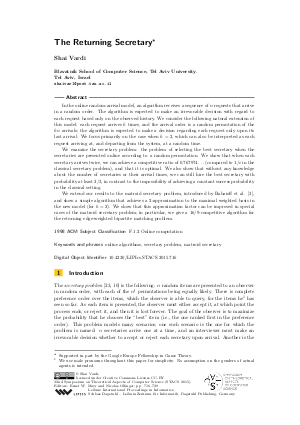The Returning Secretary
Author Shai Vardi
-
Part of:
Volume:
32nd International Symposium on Theoretical Aspects of Computer Science (STACS 2015)
Part of: Series: Leibniz International Proceedings in Informatics (LIPIcs)
Part of: Conference: Symposium on Theoretical Aspects of Computer Science (STACS) - License:
 Creative Commons Attribution 3.0 Unported license
Creative Commons Attribution 3.0 Unported license
- Publication Date: 2015-02-26
File

PDF
LIPIcs.STACS.2015.716.pdf
- Filesize: 0.6 MB
- 14 pages
Document Identifiers
Subject Classification
Keywords
- online algorithms
- secretary problem
- matroid secretary
Metrics
- Access Statistics
-
Total Accesses (updated on a weekly basis)
0PDF Downloads0Metadata Views
Abstract
In the online random-arrival model, an algorithm receives a sequence of $n$ requests that arrive in a random order. The algorithm is expected to make an irrevocable decision with regard to each request based only on the observed history. We consider the following natural extension of this model: each request arrives k times, and the arrival order is a random permutation of the kn arrivals; the algorithm is expected to make a decision regarding each request only upon its last arrival. We focus primarily on the case when k=2, which can also be interpreted as each request arriving at, and departing from the system, at a random time. We examine the secretary problem: the problem of selecting the best secretary when the secretaries are presented online according to a random permutation. We show that when each secretary arrives twice, we can achieve a competitive ratio of 0.767974... (compared to 1/e in the classical secretary problem), and that it is optimal. We also show that without any knowledge about the number of secretaries or their arrival times, we can still hire the best secretary with probability at least 2/3, in contrast to the impossibility of achieving a constant success probability in the classical setting. We extend our results to the matroid secretary problem, introduced by Babaioff et al. [3], and show a simple algorithm that achieves a 2-approximation to the maximal weighted basis in the new model (for k=2). We show that this approximation factor can be improved in special cases of the matroid secretary problem; in particular, we give a 16/9-competitive algorithm for the returning edge-weighted bipartite matching problem.
Cite As Get BibTex
Shai Vardi. The Returning Secretary. In 32nd International Symposium on Theoretical Aspects of Computer Science (STACS 2015). Leibniz International Proceedings in Informatics (LIPIcs), Volume 30, pp. 716-729, Schloss Dagstuhl – Leibniz-Zentrum für Informatik (2015)
https://doi.org/10.4230/LIPIcs.STACS.2015.716
BibTex
@InProceedings{vardi:LIPIcs.STACS.2015.716,
author = {Vardi, Shai},
title = {{The Returning Secretary}},
booktitle = {32nd International Symposium on Theoretical Aspects of Computer Science (STACS 2015)},
pages = {716--729},
series = {Leibniz International Proceedings in Informatics (LIPIcs)},
ISBN = {978-3-939897-78-1},
ISSN = {1868-8969},
year = {2015},
volume = {30},
editor = {Mayr, Ernst W. and Ollinger, Nicolas},
publisher = {Schloss Dagstuhl -- Leibniz-Zentrum f{\"u}r Informatik},
address = {Dagstuhl, Germany},
URL = {https://drops.dagstuhl.de/entities/document/10.4230/LIPIcs.STACS.2015.716},
URN = {urn:nbn:de:0030-drops-49539},
doi = {10.4230/LIPIcs.STACS.2015.716},
annote = {Keywords: online algorithms, secretary problem, matroid secretary}
}
